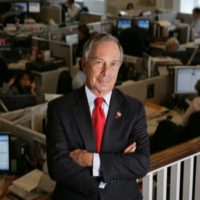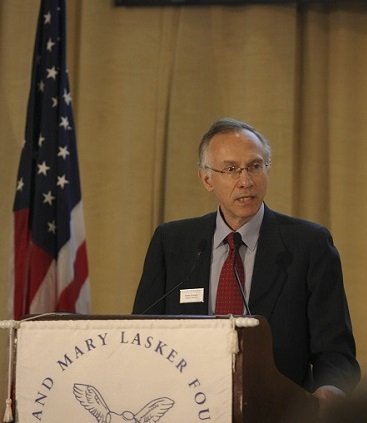
Michael R. Bloomberg
Mayor, The City of New York
For employing sound science in political decision making; setting a world standard for the public’s health as an impetus for government action; leading the way to reduce the scourge of tobacco use; and advancing public health through enlightened philanthropy.
The 2009 Mary Woodard Lasker Award for Public Service honors a government figure, thought leader, and philanthropist who has employed sound science in making political decisions and advanced public health through enlightened philanthropy. Michael R. Bloomberg has led the way in reducing the scourge of tobacco use and promoting good eating habits. He has held his course in the face of fierce opposition from powerful vested interests. By relentlessly translating knowledge about public health into bold government action, he has benefited a large urban community and set an example — and a new standard — for cities and countries across the globe. Bloomberg has fueled advances not only through his activities as an elected official, but also by backing higher education in public health with unprecedented levels of support and initiating a global program to combat tobacco use.
Bloomberg’s first signature program as mayor of New York City has slashed the use of cigarettes. The cornerstone of this enterprise is a ban on smoking in restaurants and bars. This measure initially encountered hostility from smokers and owners of these establishments, but Bloomberg forged ahead, justifying it on the grounds of occupational safety for waiters, bartenders, and other workers. The restriction, in combination with high cigarette taxes, an aggressive anti-smoking advertising campaign, and free nicotine-replacement therapy has sparked the sharpest drop in smoking since record-keeping began in 1993. Three hundred thousand fewer New Yorkers are lighting up now than when Bloomberg took office in 2002, and the impact on adolescents is especially impressive. Tobacco use in teenagers has dropped more than 50 percent and is currently less than half the national average. Because most addiction takes hold in young people, this triumph will deliver lasting benefits to New York’s citizens. Bloomberg has shown that the new law did not snuff out nightlife or douse tourism, as critics predicted. A great city could not only survive, but it could thrive, with such a restriction — and he thus established a model for other civic leaders worldwide. When New York City went smoke free, only one state and no countries had similar statutes. Now many states and nations have imposed such laws.
Award presentation by Harvey Fineberg
 As chair of the Lasker Foundation’s Public Service Award Committee, it is my privilege to provide an introduction to this year’s Lasker Public Service Award.
As chair of the Lasker Foundation’s Public Service Award Committee, it is my privilege to provide an introduction to this year’s Lasker Public Service Award.
When it comes to advancing the public’s health, no city or state has enjoyed more enlightened, courageous, and effective leadership than New York City under Mayor Michael Bloomberg. The mayor has earned a reputation as a powerful champion for health, and he has demonstrated how science-based decision-making in government can serve the public good.
In his first big health initiative as mayor of New York City, Mike Bloomberg took on tobacco — the leading preventable cause of premature death and the only legally available product that is harmful when used as intended. A cornerstone of this enterprise was a ban on smoking in restaurants and bars that went into effect in 2003. At first, Mayor Bloomberg encountered hostility from some smokers and bar owners — he began to notice, if not directly acknowledge, their one-finger salutes at parades. But when then Health Commissioner Tom Frieden brought the mayor the proposal to ban tobacco smoking in restaurants and bars, Mike Bloomberg asked only one question: “Are you certain this is going to save lives?” When the answer was “Yes,” the mayor declared, “Then do it.” Frieden, perhaps wanting to be sure, went on to say there would be opposition and political risks and — the mayor cut him off: “The first rule of salesmanship,” Bloomberg explained, “is when you have made the sale, leave.”
Interview with Michael R. Bloomberg
Video Credit: Susan Hadary
